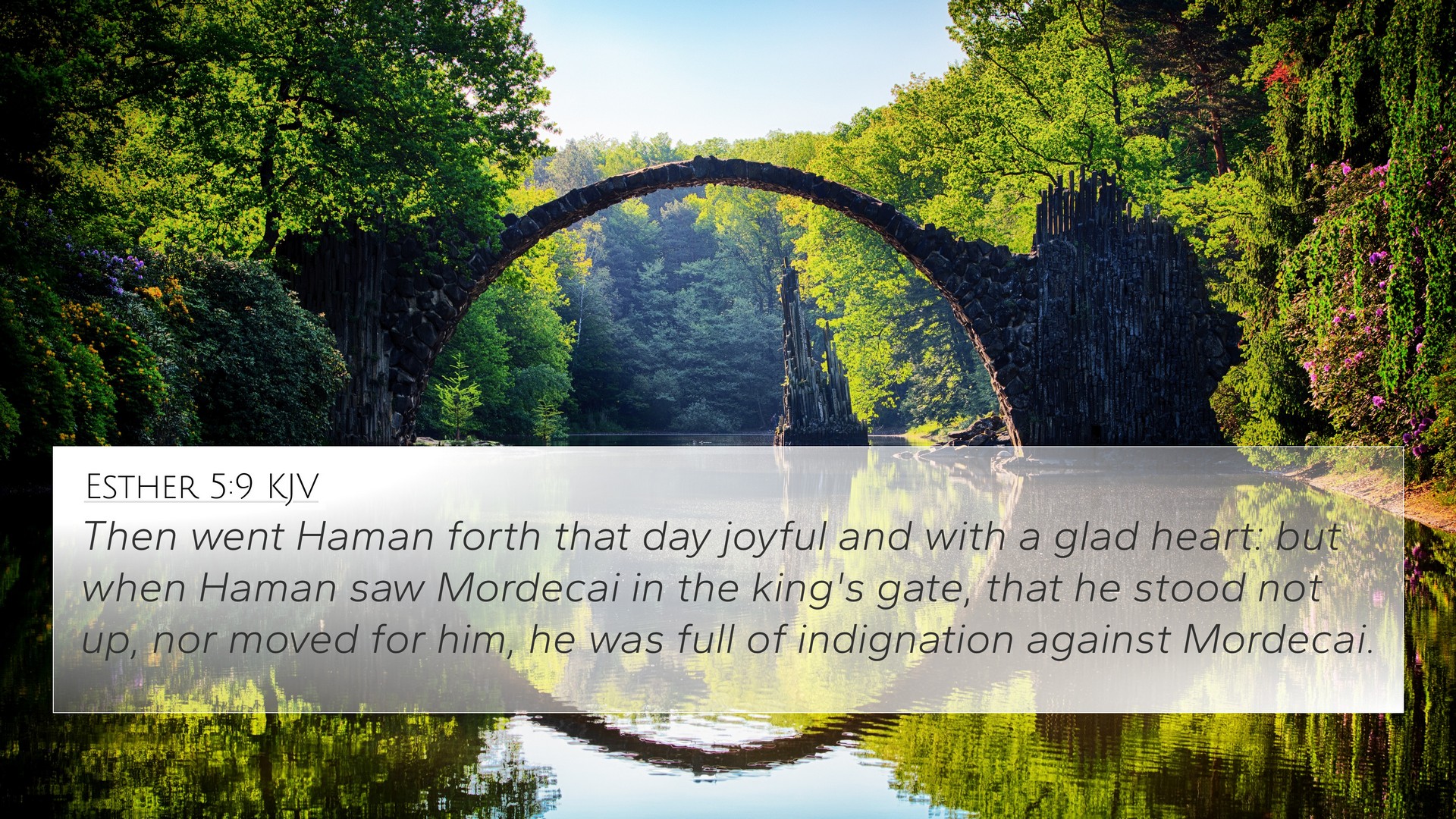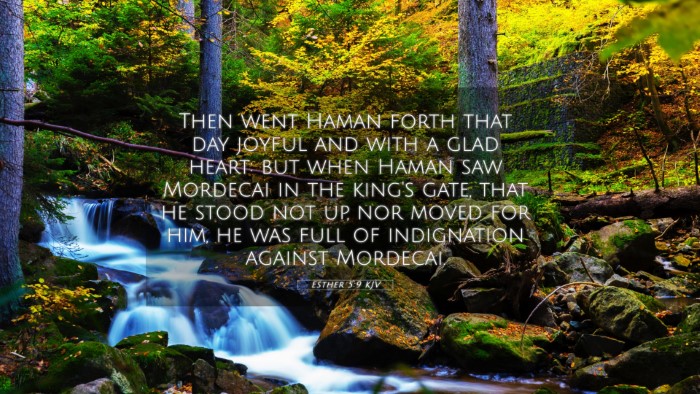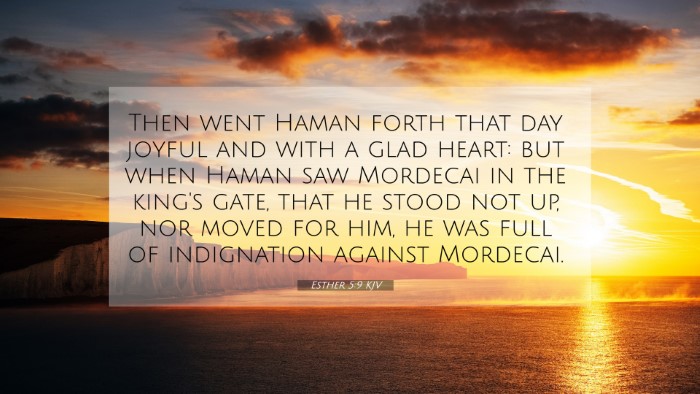Old Testament
Genesis Exodus Leviticus Numbers Deuteronomy Joshua Judges Ruth 1 Samuel 2 Samuel 1 Kings 2 Kings 1 Chronicles 2 Chronicles Ezra Nehemiah Esther Job Psalms Proverbs Ecclesiastes Song of Solomon Isaiah Jeremiah Lamentations Ezekiel Daniel Hosea Joel Amos Obadiah Jonah Micah Nahum Habakkuk Zephaniah Haggai Zechariah MalachiEsther 5:9 Similar Verses
Esther 5:9 Cross References
Then went Haman forth that day joyful and with a glad heart: but when Haman saw Mordecai in the king's gate, that he stood not up, nor moved for him, he was full of indignation against Mordecai.
Uncover the Rich Themes and Topics of This Bible Verse
Listed below are the Bible themes associated with Esther 5:9. We invite you to explore each theme to gain deeper insights into the Scriptures.
Esther 5:9 Cross Reference Verses
This section features a detailed cross-reference designed to enrich your understanding of the Scriptures. Below, you will find carefully selected verses that echo the themes and teachings related to Esther 5:9 KJV. Click on any image to explore detailed analyses of related Bible verses and uncover deeper theological insights.
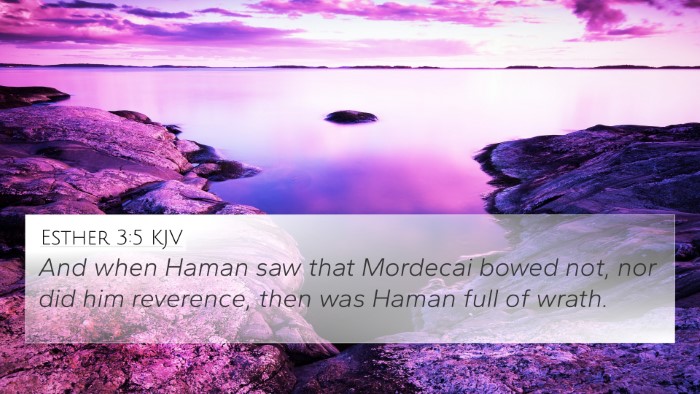
Esther 3:5 (KJV) »
And when Haman saw that Mordecai bowed not, nor did him reverence, then was Haman full of wrath.
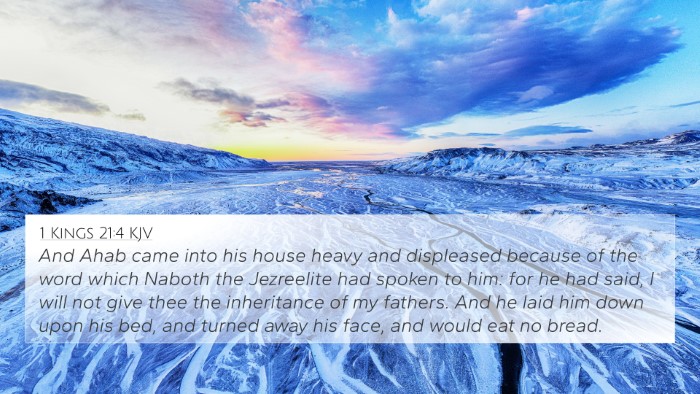
1 Kings 21:4 (KJV) »
And Ahab came into his house heavy and displeased because of the word which Naboth the Jezreelite had spoken to him: for he had said, I will not give thee the inheritance of my fathers. And he laid him down upon his bed, and turned away his face, and would eat no bread.
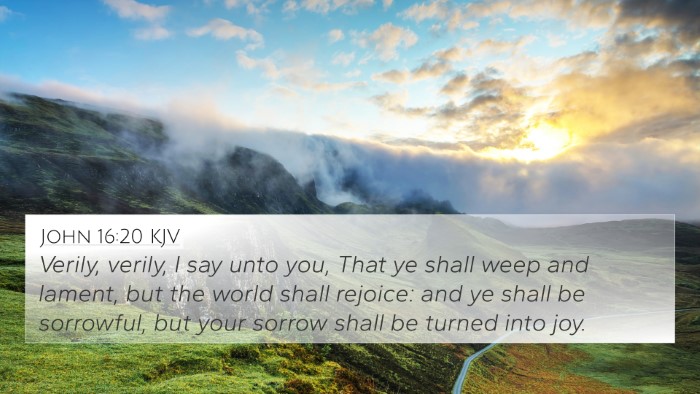
John 16:20 (KJV) »
Verily, verily, I say unto you, That ye shall weep and lament, but the world shall rejoice: and ye shall be sorrowful, but your sorrow shall be turned into joy.
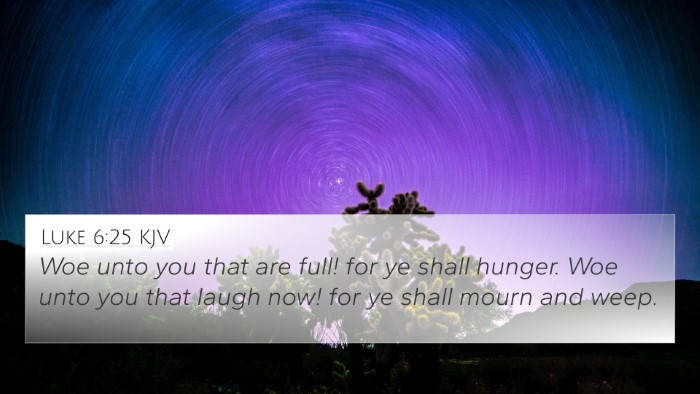
Luke 6:25 (KJV) »
Woe unto you that are full! for ye shall hunger. Woe unto you that laugh now! for ye shall mourn and weep.
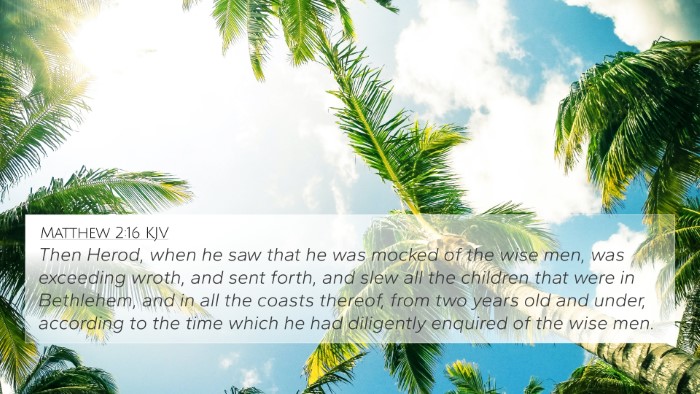
Matthew 2:16 (KJV) »
Then Herod, when he saw that he was mocked of the wise men, was exceeding wroth, and sent forth, and slew all the children that were in Bethlehem, and in all the coasts thereof, from two years old and under, according to the time which he had diligently enquired of the wise men.

Amos 6:12 (KJV) »
Shall horses run upon the rock? will one plow there with oxen? for ye have turned judgment into gall, and the fruit of righteousness into hemlock:
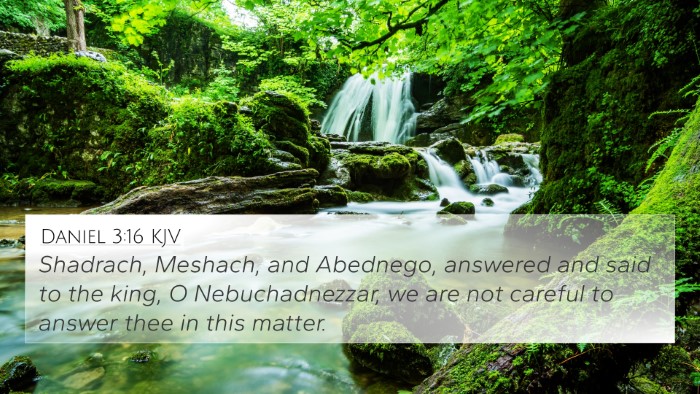
Daniel 3:16 (KJV) »
Shadrach, Meshach, and Abednego, answered and said to the king, O Nebuchadnezzar, we are not careful to answer thee in this matter.
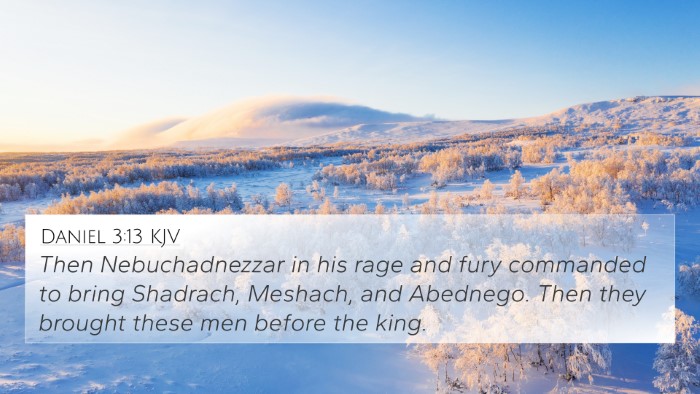
Daniel 3:13 (KJV) »
Then Nebuchadnezzar in his rage and fury commanded to bring Shadrach, Meshach, and Abednego. Then they brought these men before the king.
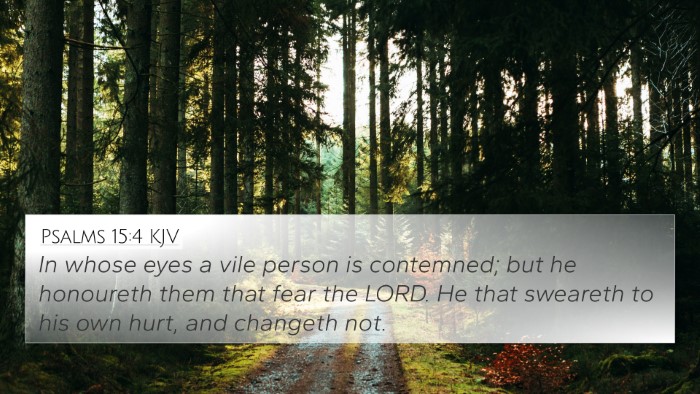
Psalms 15:4 (KJV) »
In whose eyes a vile person is contemned; but he honoureth them that fear the LORD. He that sweareth to his own hurt, and changeth not.
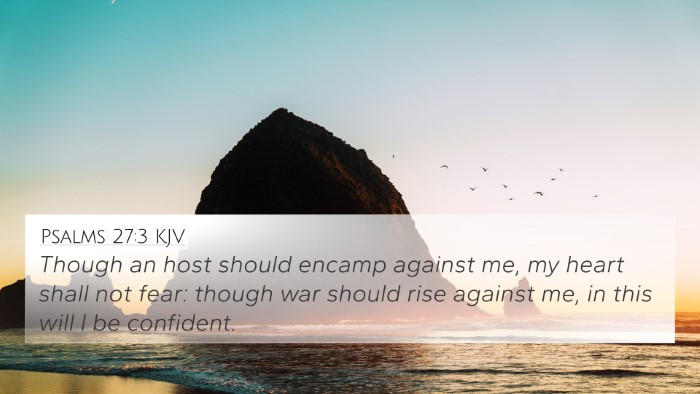
Psalms 27:3 (KJV) »
Though an host should encamp against me, my heart shall not fear: though war should rise against me, in this will I be confident.

Job 31:31 (KJV) »
If the men of my tabernacle said not, Oh that we had of his flesh! we cannot be satisfied.

Job 20:5 (KJV) »
That the triumphing of the wicked is short, and the joy of the hypocrite but for a moment?
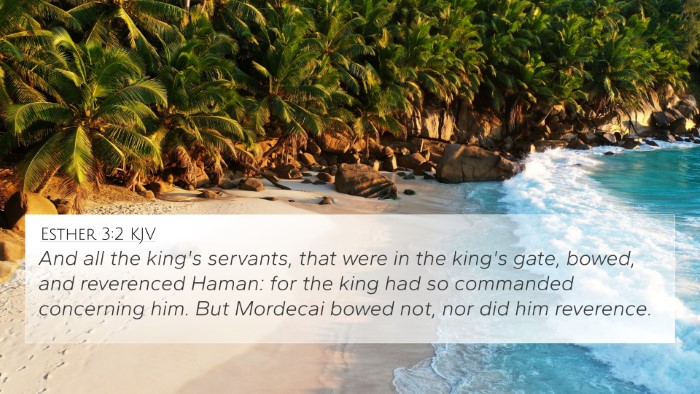
Esther 3:2 (KJV) »
And all the king's servants, that were in the king's gate, bowed, and reverenced Haman: for the king had so commanded concerning him. But Mordecai bowed not, nor did him reverence.

Esther 2:19 (KJV) »
And when the virgins were gathered together the second time, then Mordecai sat in the king's gate.
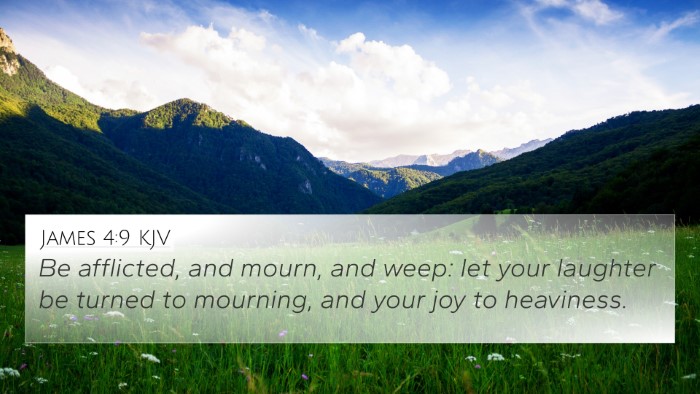
James 4:9 (KJV) »
Be afflicted, and mourn, and weep: let your laughter be turned to mourning, and your joy to heaviness.
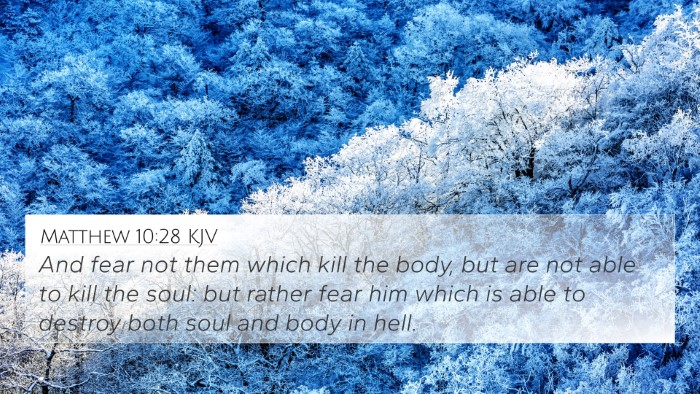
Matthew 10:28 (KJV) »
And fear not them which kill the body, but are not able to kill the soul: but rather fear him which is able to destroy both soul and body in hell.
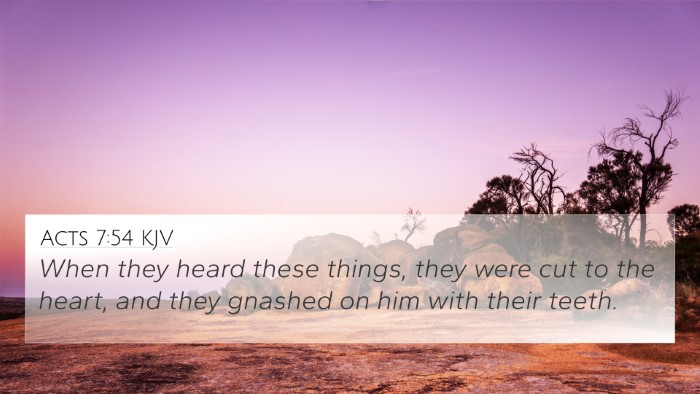
Acts 7:54 (KJV) »
When they heard these things, they were cut to the heart, and they gnashed on him with their teeth.
Esther 5:9 Verse Analysis and Similar Verses
Esther 5:9 states: "Then went Haman forth that day joyful and with a glad heart: but when Haman saw Mordecai in the king's gate, that he stood not up, nor moved for him, he was full of indignation against Mordecai."
This verse captures a significant moment in the narrative of Esther, reflecting the emotional and spiritual conflict unfolding between Haman and Mordecai. The interpretations and insights derived from this verse can be richly understood through the perspectives of public domain commentaries like those by Matthew Henry, Albert Barnes, and Adam Clarke.
Summary of Insights
- Haman's Pride and Joy:
Haman's initial joy stemmed from his elevated status at the royal banquet, showcasing the transient nature of worldly accolades. His happiness indicates a deep connection to his personal ambition, illustrating a lesson on the dangers of pride and envy.
- The Role of Mordecai:
Mordecai's refusal to honor Haman was not merely an act of defiance but was rooted in his loyalty to God and his principles. This refusal highlights the conflict between earthly powers and divine allegiance.
- Indignation Turning to Hatred:
The verse shows how quickly Haman's ego was bruised by Mordecai's noncompliance. This agitation led to greater schemes against Mordecai and reflects the poison of unchecked anger in the heart of man.
- Divine Providence:
In the overarching narrative of Esther, this moment serves as a reminder of God's unseen hand at work. Haman’s reaction can be viewed as part of the broader theme of divine intervention against injustice.
Bible Verse Cross-References
- Proverbs 16:18 - "Pride goeth before destruction, and a haughty spirit before a fall."
- James 4:6 - "But he giveth more grace. Wherefore he saith, God resisteth the proud, but giveth grace unto the humble."
- Esther 3:2 - "And all the king's servants, that were in the king's gate, bowed, and reverenced Haman: for the king had so commanded concerning him. But Mordecai bowed not, nor did him reverence."
- Matthew 5:11-12 - "Blessed are ye, when men shall revile you, and persecute you, and shall say all manner of evil against you falsely, for my sake. Rejoice, and be exceeding glad..."
- Psalm 37:1-2 - "Fret not thyself because of evildoers, neither be thou envious against the workers of iniquity."
- 1 Peter 5:5-6 - "Likewise, ye younger, submit yourselves unto the elder. Yea, all of you be subject one to another, and be clothed with humility: for God resisteth the proud..."
- Romans 12:19 - "Dearly beloved, avenge not yourselves, but rather give place unto wrath: for it is written, Vengeance is mine; I will repay, saith the Lord."
Thematic Connections and Residual Insights
The themes expressed in Esther 5:9 resonate deeply with both Old and New Testament scenarios. The conflict between Mordecai and Haman serves as a microcosm for overarching biblical principles such as:
- The Danger of Pride: Highlighted in both the Proverbs and Peter's letters, pride leads to deception and ultimately to downfall.
- The Value of Humility: Scriptural narratives repeatedly showcase that humility, as demonstrated by Mordecai, attracts God's favor, contrasting Haman's arrogance.
- Divine Justice: The assurance that God will bring justice, as seen in Romans and Psalms, provides comfort amid discord.
- Faithful Resistance: The act of standing firm in faith, like Mordecai's defiance against Haman, is echoed in Matthew and 1 Peter about the joy of suffering for righteousness' sake.
Cross-Referencing Biblical Texts
For accurate understanding, utilizing tools for Bible cross-referencing can deepen one’s interpretation when studying Esther 5:9. A Bible concordance or a cross-reference Bible study can illustrate the intricate links between this verse and others across the scriptures. Through a detailed examination, we can uncover:
- How different Biblical instances relate to works of pride and humility.
- Parallels between Esther's narrative and the overarching Biblical themes of justice and divine sovereignty.
- The integration of moral choices seen in the lives of Biblical characters from the Old Testament to the New Testament.
Engaging with the Text
Understanding Esther 5:9 requires readers to engage deeply with its lessons about pride, divine authority, and the nature of spiritual warfare. Those seeking to comprehend how to find cross-references in the Bible may benefit from exploring links not just for Esther but also throughout Solomon's Proverbs, the teachings of Jesus, and the apostolic writings. Engaging the scriptures through comparative Bible verse analysis enhances one’s study experience and reveals rich insights grounded in faith.
Conclusion
Esther 5:9 serves as a crucial moment illustrating the toxicity of pride and the importance of standing firm in faith. By examining this verse alongside its cross-references, readers can better understand its implications and apply these timeless lessons in their spiritual journeys.
